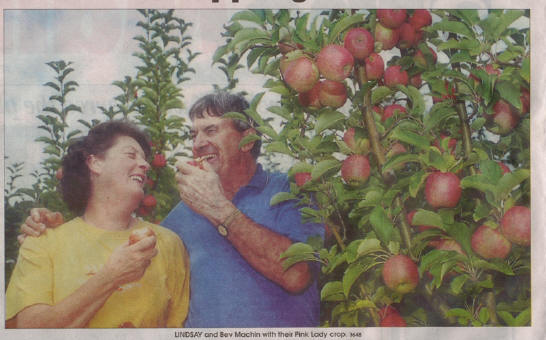
The last Somerville apple grower retires
By Mike Ryan
SOMERVILLE was Appletown; it grew the world's best apples.
The apples of Somerville sailed over the seas stored in cool chambers on the Orient Line steamers and made mouths water in London.
Those apples were declared "far superior in appearance, size and flavor to the produce of any other known fruit‑producing country."
John Brunning of Somerville pioneered the Jonathan apple which became the whole world's favorite. As early as 1886 Somerville apples were exported to the Colonial and Indian Exhibition in London and (a historian noted) established Somerville in the eyes of the world.'
In 1932 a case of apples grown by A E Dennett of Somerville won the "Apples for King George W' blue ribbon at Melbourne Town Hall.
The annual apple show in Somerville Fruitgrowers Reserve ran as the largest show in the southern hemisphere from 1895 to 1939.
The era of the Somerville ap 1 passed its peak after World War Two.
Big blocks of land were sliced up for house lots. The big growers closed ‑ Mentiplay, Dennett, Haywood.
Two years ago Trevor and Shirley Smith on Northside Somerville stopped picking apple crops and left their trees untended. Smiths were the second last apple grower in Somerville.
And now the Machins of southwest Somerville are beginning their last pick. They're the very last commercial apple growers in Somerville.
"Fifty years of apples seemed enough," said Lindsay Machin, 66.
"Soon we can travel within Australia. Tassie by boat, to star."
His wife Bev agrees. "We want to do some of the things work prevented. The opera in the city, a ferry down the Yarra."
Lindsay Machin's father, Perey came from Cheshire, England. Percy Machin share‑farmed the 90‑acre Somerville orchard with Sid Scott, served in the Australian Army in North Africa in the 1940s and bought the orchard for 9500 pounds. Lindsay Machin did his load of the work from his days at Somerville Primary School and Caulfield Tech (11 hours a day away from home).
As a small boy he led horses that ploughed and pulled trailers of apples. Later, father and son would load up the Bedford two tonne truck and chug in to the Victoria Market, later the Footscray Market, in the early hours.
The first Ferguson tractor came in 1950, "the old grey Fergie" that still stands on their now smoothly tailored grounds, mowed by tireless Bev. They had two Fiat tractors since.
The Machins successfully grew jonnies and grannies (Jonathans and Granny Smiths) but the market shifted, new varieties tumbled on to the shelves.
They grew Golden Dells (Delicious), Gravvies (Gravenstein), Red Delicious, Fuj i, Gala and the vogue, Pink Lady.
In a good year they pick 4000 cases, 20 kg of apples a case.
First Lindsay used to cart heavy pine steps to stand on to pick.
The next 40 years Lindsay and Bev spent two months each autumn up ladders picking.
Then he got a "cherry picker" machine which doesn't pick cherries or apples but provides an easy perch aloft to continue the work of the hand. A twist of the wrist, leg break fashion, plucks half a dozen apples in seconds without tearing off twigs as well, the way the inexperienced do.
Talking sport, Lindsay built wire cricket nets in the grounds for daughter Linda. She plays cricket for Hawthorn and Victoria besides picking and planting.
Where the irrigation hoses stretch 11 acres, the only water used to come from rain.
In dry seasons, "we strawed round the trees ... always got through." Semi‑trailer loads of straw bales came from the country.
Bev Grant met Lindsay Machin when the Somerville Debutante Ball was coming up.
Her clan name is on Grant Road, Somerville.
The couple will push over the apple trees, put the land to pasture and put. steers on, after the last Somerville apples go to market.
[The Mornington Mail - April 25, 2002] The Original article FORMAT